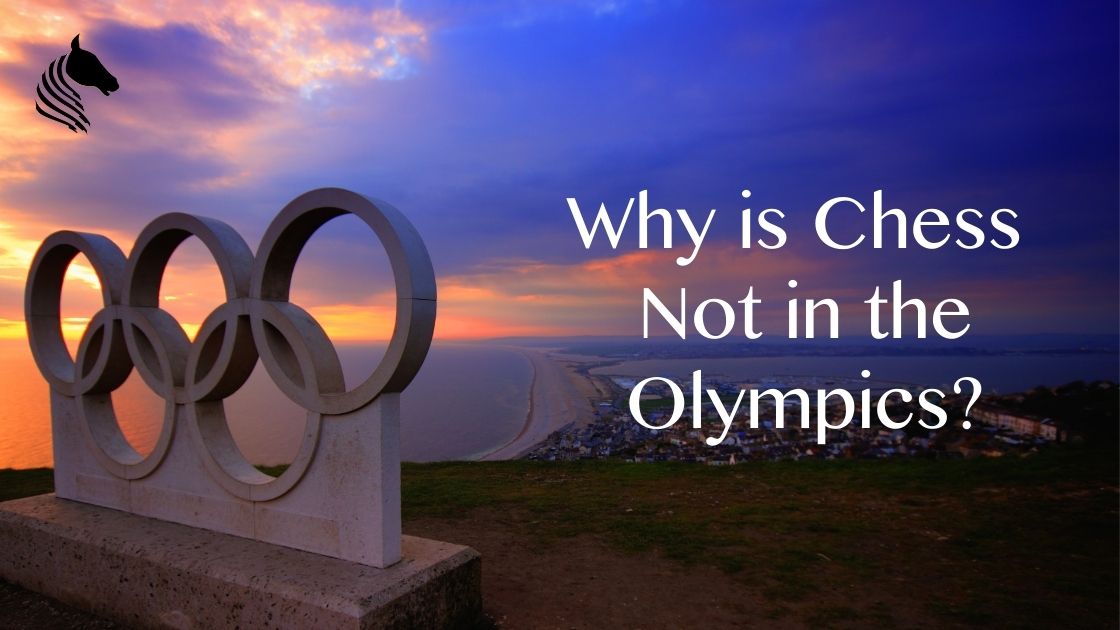28 Apr Why is Chess Not in the Olympics?

The International Olympic Committee recognized chess as a sport two decades ago. While this acknowledgment falls shy of recognition as an “Olympic Sport,” which would merit inclusion in the Games, it is an acknowledgment of the sport-like properties inherent in chess. If the Olympic committee considers chess a sport, why is it not in the Olympics?
The way things have moved around the world, we believe chess would have been the only sport that could have had a “remote” chance of getting played (pun intended!) since people can play it remotely. Tokyo Olympics (2020, although yet to be held due to Covid-19 Pandemic) rejected the bid by the World Chess Federation (FIDE), and so has the Paris 2024 Committee.
Chess players have been dreaming the Olympic dream since the International Olympic Committee (IOC) recognized chess as a “potential” Olympic sport in 1999. Those who love chess know about Chess Olympiads, but there has never been news about Chess in the Olympics.
So why is chess not in the Olympics? What is stopping the game of the kings from taking its rightful place in the ancient games started by kings?
Let’s explore this for you.
Why chess is not in the Olympics and why it matters the most now!
Oxford dictionary defines a sport as “an activity involving physical exertion and skill in which an individual or team competes against another or others for entertainment.” Chess does not require athleticism; therefore, chess is not a part of the Olympics, however debatable that may sound.
This article aims to bring out the key aspects of the debate from all perspectives and answer some commonly asked questions. We are sure you will enjoy reading the rest of it! Let’s move on to understand which sports make the cut for the Olympics first.
What are the criteria for including a sport in the Olympics?
What does it take to be an Olympic Sport? Why do activities like breakdancing cut the quadrennial sporting extravaganza but not an ancient game like chess which has millions playing it around the world?
There are specific steps to be followed for a sport to become a part of the games. Here are the steps to be followed in the process of making it to an Olympic sport:
- Recognition as a sport from the International Olympic Committee (IOC).
- A recognized sport then moves to International Sports Federation (IF) status.
- To be accepted, a sport must be widely practiced by men in at least 75 countries and on four continents and by women in no fewer than 40 countries and on three continents
- The IOC requires that the activity have administration by an international nongovernmental organization that oversees at least one sport.
- The international organization administering the sport must enforce the Olympic Movement Anti-Doping Code, including conducting effective out-of-competition tests on the sport’s competitors while maintaining rules set forth by the Olympic Charter.
- IOC can admit an activity into the Olympic program as a sport, a discipline (which is a branch of a sport), or an event ( which is a competition within a discipline).
Every few years, the IOC reviews the existing games and comes up with a revised list of games. To remain on the list of Olympic games, the sport must increase the “value and appeal” of the Olympics and retain and reflect its modern traditions. Purely “mind sports” are not included, nor are machine-based sports. So Formula one racing and chess do not make the cut. There are other constraints like media and public interest, space required to play the games, and specific sports needs.
For example, once a respected Olympic sport, Tug-of-war is no more played in Olympics, and so are polo, rink hockey, water skiing. They were all once part of the Olympic Games but have been discontinued over the years.
To keep the elusive Olympic hope alive, chess has long been complying with the IOC rules, even if most of them make no sense at all when it comes to a mind sport like chess. For instance, official chess tournaments have been put through the same doping rules as other sports, which has definitely not brought any more fairness to the game.
Why does everyone want chess to be an Olympic sport?
For years, FIDE has been campaigning to include chess into the elite group of Olympic sports. Even though chess has been around for centuries, and it is also one of the most well-documented, analyzed, and understood games. Chess is played in more than 75% of the countries around the world. It is also one of the most organized sports with clear, well-drafted rules, policies, and procedures.
The game of chess has a “genuine global appeal,” It has 195 national federations and 600 million people who practice chess globally. The ranking system and evaluation are top-notch and ensure only the best players get past the various benchmarks. The players are also required to continuously work on their game, ensuring regular participation of star players in recurring events, if only to slightly improve or maintain their rankings.
Despite this, Chess players have often not received their due. The game of the brain lacks the flashy flamboyance and adrenaline-pumping thrill of an extreme sport like river rafting. At the same time, the overall aura of chess players being a bunch of snobbish brainiacs hiding their disdain for commoners behind their moves and pieces, often leading obscure, eccentric lives, has been difficult to shake off.
Still, FIDE and most of the established players feel that an entry to the Olympics arena will help “institutionalize chess,” to borrow from the Indian Grandmaster Viswanathan Anand, ‘”It will definitely benefit the sport. This year the numbers have been very good for chess… Queen’s Gambit has become the most-watched series on Netflix. Who would have thought that the sales of chess boards and sets from stores would increase the way it has currently…”
The reason behind this push to be included as an Olympic sport is also financial. Sports tend to receive much more funding at home than non-Olympic sports. Germany, for instance, has the Ministry of the Interior financially supporting all sports which are qualified for Olympics. The ratio of financial support between Olympic and non-Olympic sports is approximately 10:1, and the difference is even more pronounced in other countries.
Being an Olympic sport would mean that chess would receive recognition (and funding) as a sport. This is especially important in countries where chess is not recognized as a sport, and for cultural reasons, will probably never be recognized as a sport.
Is chess a sport?
Now let’s get into the discussion that has been going on for decades without any conclusion.
Is chess a sport?
Can it be classified as a sport and not as a board game? How is it different from other boardgame and indoor strategy games?
To the uninitiated, there is a considerable difference between chess and other board games. Chess has a governing body, a formal structure, and a widely accepted uniformity in rules, techniques, and regulations. Most board games do not match the singularity in terms of acceptable and what is not that chess brings to the table.
Those who believe chess is just a mind game are grossly ill-informed, too. Ask any accomplished chess player, and they will swear by the pre-match preparations, including diet, fitness, and exercise that prepares them before the big day. Chess grandmaster Levon Aronian has been quoted saying:
The best way to manage the stress is to be in good physical shape. At this moment, I have lots of chess knowledge and, therefore, apart from chess, I need to have physical strength.
What makes chess a sport?
- Its wide acceptance as an indoor game
- It’s well functioning governing body with almost a century-long existence.
- It’s a vast body of talented players with an advanced ranking and rating system, even the best athletic games like gymnastics and track and field events don’t have a “points” system as developed as chess.
- The fact that chess games have adopted a time-bound format. Not to mention the fact that 20 years ago, in 1999, IOC itself recognized chess as a sport.
- The broader appeal, chess is one of the most played games in the world right now. Since it adapted beautifully to online platforms way ahead of its time, chess has achieved remarkable popularity during the pandemic period.
Why some people don’t want chess to be a part of the Olympics
Despite its popularity and mass appeal, chess is mocked by people who think the Olympics is all about proving your physical superiority. There are games like Equestrian Olympics involving an animal, or synchronized swimming, which are not a showcase or representation of a nation’s sporting culture. These people have their own reasons to claim that chess and many other mind games can’t be a part of the Olympics.
Here’s what they usually say-
- Chess is not a sport. It doesn’t involve your body at all. Olympics have to have sports that balance both body and mind. Chess doesn’t make the cut.
- Chess is a long-drawn game and a boring one at that. Noted, sports channels like ESPN are broadcasting crucial chess games and even highlighting achievements of star chess players. Still, overall, no one wants to watch a game with two players brooding and inactively sitting over a chessboard.
- Chess is still a challenging game to be understood by the masses. Athletics and other games may appeal more to people because they can witness the actions and their consequences. In chess, often, the rules define a player’s destiny, and their mind power may or may not play a huge role.
Conclusion
Chess has been a part of our lives for centuries, yet, whenever it comes to recognizing it as a sport, eyebrows are raised, and cynics mock at its fat chance. Many players feel that bringing glory to one’s country in the form of Olympic medals would be the ultimate honor for any chess player. The only possibility of chess becoming a part of the Olympic games is if the IOC expands the types of Olympic Games being held ( Mind Sports and Extreme Sports categories).
But for millions of chess players, instructors, tournament organizations, and chess enthusiasts around the world, chess is just as much a sport as any other, and they are looking forward to the next chance to claim the glorious checkmate.





